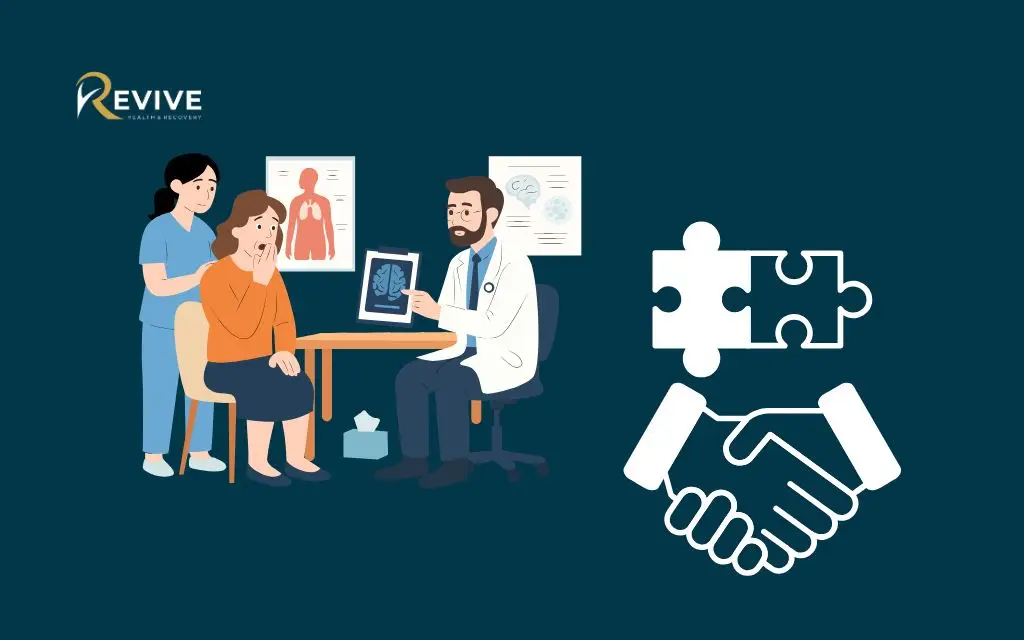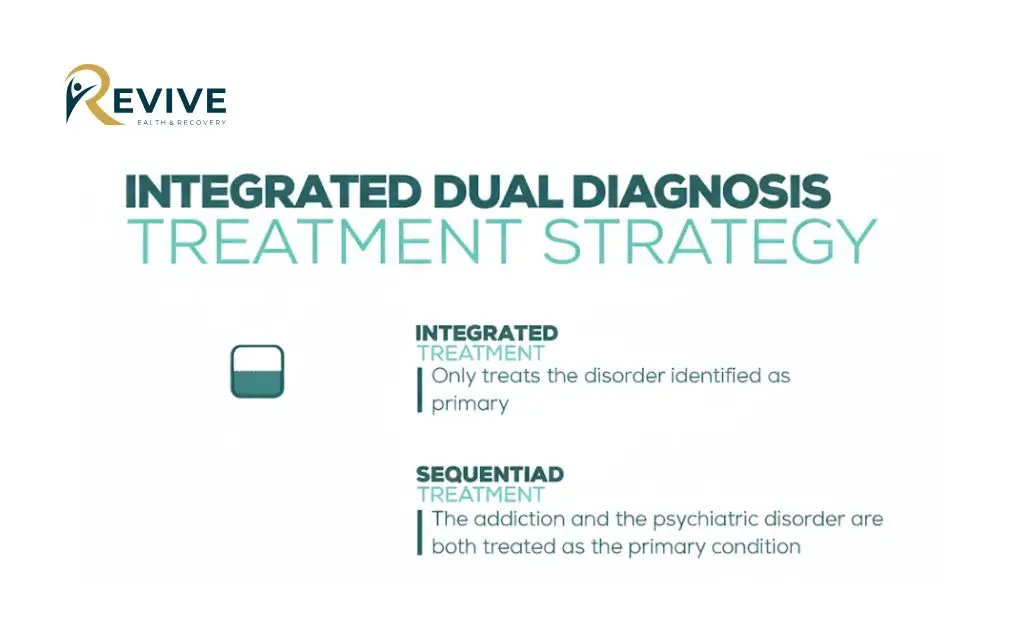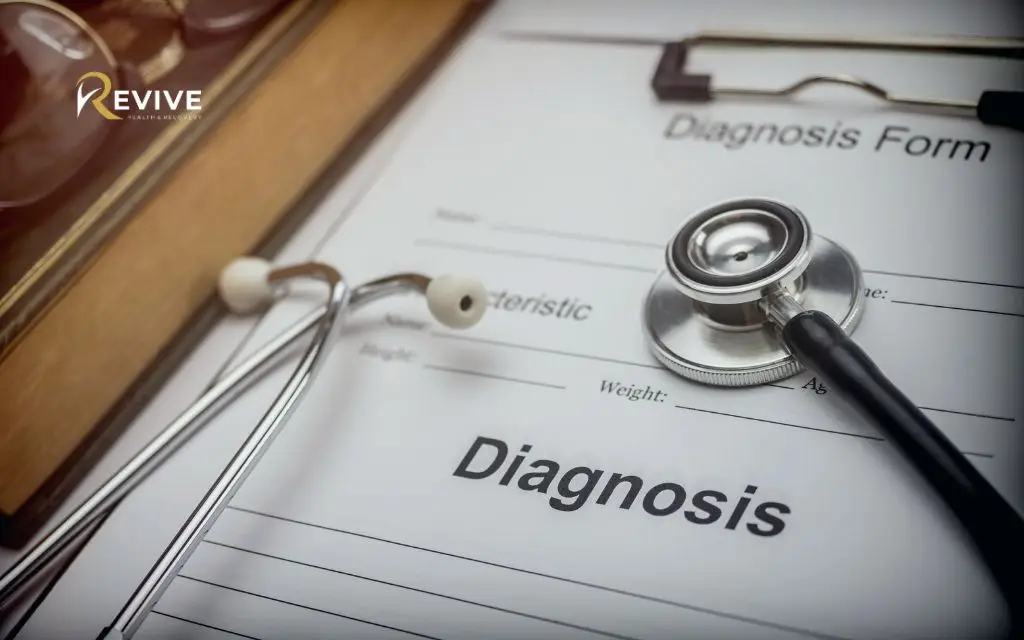Why do some people struggle with addiction recovery despite multiple treatment attempts? The answer often lies in untreated mental health conditions that fuel the cycle of substance use. This complex situation is called dual diagnosis, where someone faces both a substance use disorder and a mental illness like depression, anxiety, or PTSD simultaneously.
Integrated dual diagnosis treatment represents a breakthrough approach that addresses both conditions together rather than separately. Think of it like treating a broken leg and dislocated shoulder at the same time with one coordinated medical team instead of bouncing between different doctors who don’t communicate.
This evidence-based solution has transformed recovery outcomes for thousands of people across Colorado. Research shows 40-60% better results compared to traditional treatment methods that handle addiction and mental health as separate issues.
This guide will help you understand why integrated treatment works, how it differs from conventional approaches, and how to find quality integrated dual diagnosis treatment Denver residents trust for lasting recovery.
What is dual diagnosis?
Understanding co-occurring disorders
Dual diagnosis occurs when someone experiences both a substance use disorder and a mental health condition at the same time. These aren’t separate problems that happen to occur together. They’re interconnected conditions that feed off each other in complex ways.
The brain chemistry involved in addiction directly impacts mental health, while untreated mental illness often drives people to self-medicate with drugs or alcohol. This creates a vicious cycle where each condition makes the other worse.
In Colorado, approximately 1 in 4 adults with serious mental illness also struggles with substance use disorders. Among people with substance use disorders, about 60% have co-occurring mental health conditions. These statistics highlight how common dual diagnosis really is.
Common co-occurring disorder combinations
- Depression and alcohol use disorder affects nearly 40% of all dual diagnosis cases. People with depression often use alcohol to numb emotional pain, but alcohol is a depressant that worsens mood symptoms over time.
- Anxiety disorders paired with prescription drug abuse has become increasingly common in Colorado. Many people start with legitimate prescriptions for anxiety medications, then develop dependency as their anxiety symptoms worsen without proper treatment.
- PTSD and stimulant addiction frequently occurs among veterans and trauma survivors. Stimulants temporarily mask trauma symptoms but prevent the brain from properly processing traumatic experiences.
- Bipolar disorder combined with cocaine use creates particularly dangerous situations. Cocaine use during manic episodes can trigger psychosis, while use during depressive episodes increases suicide risk.
- Schizophrenia and cannabis use disorder presents unique challenges. While some people use cannabis to self-medicate, regular use can worsen psychotic symptoms and interfere with antipsychotic medications.
The devastating impact of untreated dual diagnosis
Untreated dual diagnosis creates cascading problems across every area of life. Health consequences include higher overdose risk, faster progression of mental illness symptoms, and increased medical complications from drug interactions.
Career and financial stability suffer as both conditions impair judgment, concentration, and reliability. People with untreated dual diagnosis are three times more likely to experience unemployment and face significantly higher healthcare costs.
Relationships deteriorate as unpredictable behavior patterns strain family bonds and social connections. Many people become increasingly isolated, losing their support networks when they need them most.
Legal problems escalate as both conditions increase risky behavior. Statistics show people with dual diagnosis face incarceration rates 2-3 times higher than those with single conditions.
Why separate treatment fails
The interconnected nature of dual diagnosis
Mental health and substance use disorders share common brain pathways and neurotransmitter systems. Treating one while ignoring the other is like trying to fix a car engine while the transmission remains broken. Both systems need repair for the vehicle to run properly.
Substance use directly worsens mental health symptoms by disrupting brain chemistry balance. Alcohol depresses mood and anxiety regulation systems. Stimulants create artificial highs followed by severe crashes that trigger depression and anxiety. Opioids interfere with natural endorphin production, leading to increased depression and pain sensitivity.
Meanwhile, untreated mental illness drives continued substance use as people desperately seek relief from psychological pain. Depression creates hopelessness that makes recovery seem impossible. Anxiety triggers panic that substances temporarily relieve. PTSD flashbacks become unbearable without chemical numbing.

Critical limitations of sequential treatment
Traditional treatment approaches handle addiction and mental health separately. A person might complete addiction treatment, then get referred to a psychiatrist for depression care. This creates dangerous gaps where neither condition receives adequate attention.
Communication failures between providers lead to conflicting advice. The addiction counselor says avoid all mood-altering substances, while the psychiatrist prescribes antidepressants. Nobody coordinates care to ensure treatments work together effectively.
Sequential treatment shows relapse rates of 60-80% because underlying mental health issues remain untreated during addiction recovery. When depression, anxiety, or trauma symptoms resurface, people return to substance use as their primary coping mechanism.
The time delays between treatments often prove disastrous. Waiting lists for mental health services can stretch weeks or months while someone tries to maintain sobriety without proper psychiatric support.
Real-world consequences of fragmented care
Emergency departments see the same dual diagnosis patients repeatedly for overdoses, suicide attempts, and psychiatric crises. Each crisis intervention costs thousands of dollars while providing no lasting solution.
Families watch their loved ones cycle through multiple treatment programs without success. Hope fades as expensive treatments fail to address the root cause of both conditions.
People lose faith in treatment altogether after experiencing failure with fragmented approaches. They often believe they’re “unfixable” and stop seeking help entirely.
Integrated dual diagnosis treatment – the optimal solution
Evidence-based model recognition
The Substance Abuse and Mental Health Services Administration (SAMHSA) recognizes Integrated Dual Disorder Treatment (IDDT) as one of only ten evidence-based practices for mental health services. This recognition means extensive research proves its effectiveness.
Integrated treatment follows a simultaneous approach where the same clinical team addresses both conditions using coordinated interventions. Instead of bouncing between different providers, patients work with specialists trained in both addiction and mental health care.
The stage-wise recovery model adapts treatment intensity to match where someone is in their recovery journey. The four stages include engagement (building trust), persuasion (developing motivation), active treatment (intensive skill-building), and relapse prevention (maintaining gains).

Comprehensive treatment team approach
- Psychiatrists provide medication management for both psychiatric symptoms and addiction treatment medications. They understand how different substances interact with mental health medications and can adjust treatments safely.
- Licensed therapists specializing in dual diagnosis use evidence-based approaches like Cognitive Behavioral Therapy to address thought patterns that drive both conditions. They help people develop healthy coping skills to replace substance use.
- Certified addiction counselors bring specialized expertise in substance use disorders while understanding how mental health symptoms impact addiction recovery. They provide practical tools for maintaining sobriety while managing psychiatric symptoms.
- Case managers coordinate care between different services and help navigate insurance, housing, employment, and other practical barriers to recovery. They ensure nothing falls through the cracks during treatment.
- Peer support specialists offer hope and guidance from their own lived experience with dual diagnosis recovery. They provide unique insights that complement professional treatment.
Core treatment components include in Integrated dual diagnosis treatment
- Cognitive Behavioral Therapy (CBT) helps people identify and change thinking patterns that contribute to both substance use and mental health symptoms. Patients learn to recognize triggers and develop healthier responses.
- Dialectical Behavior Therapy (DBT) teaches emotional regulation and distress tolerance skills essential for managing both conditions. These skills help people cope with difficult emotions without turning to substances.
- Motivational Interviewing (MI) enhances intrinsic motivation for change by helping people explore their own reasons for recovery. This approach respects individual autonomy while building commitment to treatment.
- Trauma-informed care addresses underlying traumatic experiences that often contribute to both addiction and mental illness. Trauma treatment is essential for lasting recovery from dual diagnosis.
- Medication-assisted treatment combines FDA-approved medications with counseling for opioid and alcohol use disorders. Medications are carefully coordinated with psychiatric treatments to ensure safety and effectiveness.
- Family therapy and education helps heal relationships damaged by both conditions while building strong recovery support systems. Families learn how to support recovery without enabling harmful behaviors.
Superior benefits of integrated treatment
Research-proven effectiveness
Clinical studies consistently show integrated dual diagnosis treatment produces 40-60% better outcomes compared to traditional separate treatment approaches. These improvements appear across multiple measures including reduced substance use, improved mental health symptoms, and enhanced quality of life.
Long-term recovery rates remain significantly higher at one, three, and five-year follow-up periods. People who receive integrated treatment maintain their gains longer and require fewer repeat treatment episodes.
Colorado-specific data shows similar outcomes, with state-funded integrated programs reporting higher completion rates and lower readmission rates compared to traditional treatment models.
Dramatically reduced relapse rates
Integrated treatment addresses root causes driving both conditions rather than just treating symptoms. When underlying mental health issues receive proper attention alongside addiction treatment, people develop genuine stability instead of temporary sobriety.
Comprehensive skill development gives people tools to handle both addiction triggers and mental health symptoms. They learn to manage depression without alcohol, cope with anxiety without benzodiazepines, and process trauma without numbing substances.
Crisis prevention becomes possible when both conditions receive ongoing monitoring and support. Warning signs get caught early before they escalate into full relapse situations.
Enhanced quality of life outcomes
People report significant improvements in work performance, relationship quality, and daily functioning when both conditions receive coordinated treatment. They’re able to pursue goals and dreams that seemed impossible during active dual diagnosis.
Physical health improves as both substance use and psychiatric symptoms stabilize. Sleep patterns normalize, appetite returns, and medical complications decrease.
Self-esteem and hope increase as people experience genuine recovery success. They develop confidence in their ability to handle life’s challenges without substances or psychiatric crises.
Cost-effectiveness advantages
Integrated treatment often costs less than repeated attempts at separate treatments. One coordinated program replaces multiple treatment episodes, emergency interventions, and crisis services.
Healthcare utilization decreases significantly as people maintain stability longer and require fewer emergency department visits or psychiatric hospitalizations.
Families experience financial relief as their loved ones achieve stable recovery and become productive members of society again.
Finding quality integrated treatment in Colorado
Essential selection criteria
Look for programs specifically certified in SAMHSA’s Integrated Dual Disorder Treatment model. True IDDT implementation requires specialized training and ongoing fidelity monitoring to ensure evidence-based practices are followed.
Staff credentials should include dual diagnosis specialization beyond basic addiction or mental health training. Ask about specific education in treating co-occurring disorders and evidence-based practices like CBT, DBT, and MI.
Accreditation from organizations like The Joint Commission or CARF demonstrates commitment to quality standards and continuous improvement in treatment delivery.
Critical questions for potential providers

- “How closely do you follow the SAMHSA IDDT model?” True integrated programs should be able to explain their fidelity to evidence-based practices in detail.
- “What specialized training do your clinicians have in dual diagnosis?” Look for specific education in co-occurring disorders, not just general mental health or addiction credentials.
- “How do you coordinate mental health and addiction services?” The same team should handle both conditions rather than referring between separate programs.
- “What role do families play in your treatment program?” Quality integrated treatment includes family education, therapy, and support services.
- “What ongoing support do you provide after treatment completion?” Recovery requires long-term support, especially for dual diagnosis.
Colorado-specific considerations
Colorado’s behavioral health system offers expanded Medicaid coverage for integrated dual diagnosis treatment. Most major insurance plans also cover evidence-based integrated programs when medically necessary.
Denver metro area transportation access can impact treatment participation. Look for programs with convenient locations or transportation assistance.
Cultural competency becomes important for Colorado’s diverse population. Some programs offer specialized services for specific communities or languages.
Red flags to avoid
- Avoid programs that use one-size-fits-all approaches without individualized treatment planning. Dual diagnosis requires personalized care addressing each person’s unique combination of conditions.
- Be wary of programs that exclude family involvement or don’t offer family education and support services. Family participation significantly improves dual diagnosis treatment outcomes.
- Programs that can’t provide clear outcome data or success rates may not track their effectiveness properly. Quality programs should measure and report their results.
- High staff turnover indicates potential problems with program management and treatment consistency. Stable therapeutic relationships are essential for dual diagnosis recovery.
- Pressure to make immediate treatment decisions is unethical. Reputable programs allow time to research options and make informed choices.
Insurance and financial considerations
Understanding Colorado coverage
- Colorado’s mental health parity laws require insurance companies to provide equal coverage for behavioral health services, including integrated dual diagnosis treatment. This means your insurance must cover these services at the same level as medical treatments.
- Medicaid expansion in Colorado has significantly improved access to dual diagnosis treatment for lower-income residents. Many integrated programs accept Medicaid and can help with enrollment if needed.
- Private insurance companies increasingly recognize the cost-effectiveness of integrated treatment and are more willing to authorize these services compared to multiple separate treatments.
Making treatment accessible
- Many providers offer sliding fee scales based on income to make treatment affordable for people without full insurance coverage. These programs adjust costs based on your financial situation.
- Employee Assistance Programs through employers often provide behavioral health benefits that can cover integrated dual diagnosis treatment. Check with your HR department about available resources.
- Payment plans allow you to spread treatment costs over time rather than paying large amounts upfront. Most quality programs work with patients to create manageable payment arrangements.
Contact Revive Health Recovery at (303) 268-4655 to discuss your specific insurance coverage and explore financial assistance options that may be available.
FAQs about integrated dual diagnosis
How long does integrated dual diagnosis treatment typically take in Denver?
Treatment duration varies based on individual needs, but most people participate in intensive outpatient treatment for 3-6 months with ongoing support afterward. Revive Health Recovery customizes treatment length to ensure lasting recovery success.
What makes integrated treatment different from traditional rehab programs?
Integrated treatment addresses mental health and addiction simultaneously with the same specialized team, while traditional programs often treat these conditions separately. This coordinated approach significantly improves outcomes and reduces relapse rates.
Does insurance cover integrated dual diagnosis treatment in Colorado?
Yes, Colorado’s mental health parity laws require insurance coverage for evidence-based dual diagnosis treatment. Revive Health Recovery accepts most major insurance plans and can help verify your coverage benefits.
Can family members participate in integrated dual diagnosis treatment?
Family involvement is a crucial component of effective integrated treatment. Revive Health Recovery includes family therapy, education programs, and support groups to strengthen recovery and improve long-term outcomes.
What types of mental health conditions are commonly treated with addiction?
Depression, anxiety disorders, PTSD, bipolar disorder, and ADHD frequently co-occur with substance use disorders. Revive Health Recovery specializes in treating all major co-occurring disorder combinations with evidence-based approaches.
Begin your integrated recovery journey with Revive Health Recovery
At Revive Health Recovery, we specialize in evidence-based integrated dual diagnosis treatment that addresses both mental health and substance use disorders simultaneously. Our comprehensive outpatient program combines proven clinical practices with compassionate, personalized support designed to fit your life while delivering intensive care for lasting recovery.
Why choose Revive Health Recovery for integrated treatment:
- Our program follows SAMHSA’s evidence-based IDDT model with proven outcomes and measurable results for dual diagnosis recovery.
- Specialized clinicians with advanced training in co-occurring disorders provide expert care tailored to your unique needs.
- Comprehensive outpatient services offer flexible scheduling for working adults and parents who need intensive treatment without residential placement.
- We accept most major insurance plans and welcome Medicaid to make quality care accessible for all Colorado residents.
- Located conveniently at 1427 S Federal Blvd in Denver with easy access from throughout the metro area.
- Individualized treatment planning ensures your specific combination of mental health and substance use issues receives targeted attention.
- Family-centered approach heals relationships while building strong recovery support systems for long-term success.
Conclusion
Don’t let co-occurring mental health and substance use disorders control your life any longer. Recovery is not only possible but probable with the right integrated treatment approach. Our compassionate team guides you through every step of your journey toward lasting wellness.
Contact Revive Health Recovery now:
- Call 24/7 helpline: (303) 268-4655
- Email: contact@revivehealthrecovery.com
- Visit: 1427 S Federal Blvd, Denver, CO 80219
Our experienced intake specialists are standing by to answer your questions, verify insurance coverage, and help you begin your personalized integrated treatment plan. Call now – your recovery starts today.
Recovery from dual diagnosis requires specialized care that addresses both conditions together. At Revive Health Recovery, we provide the integrated dual diagnosis treatment Denver residents trust for lasting recovery success. Contact us today to learn how our evidence-based approach can transform your life.



